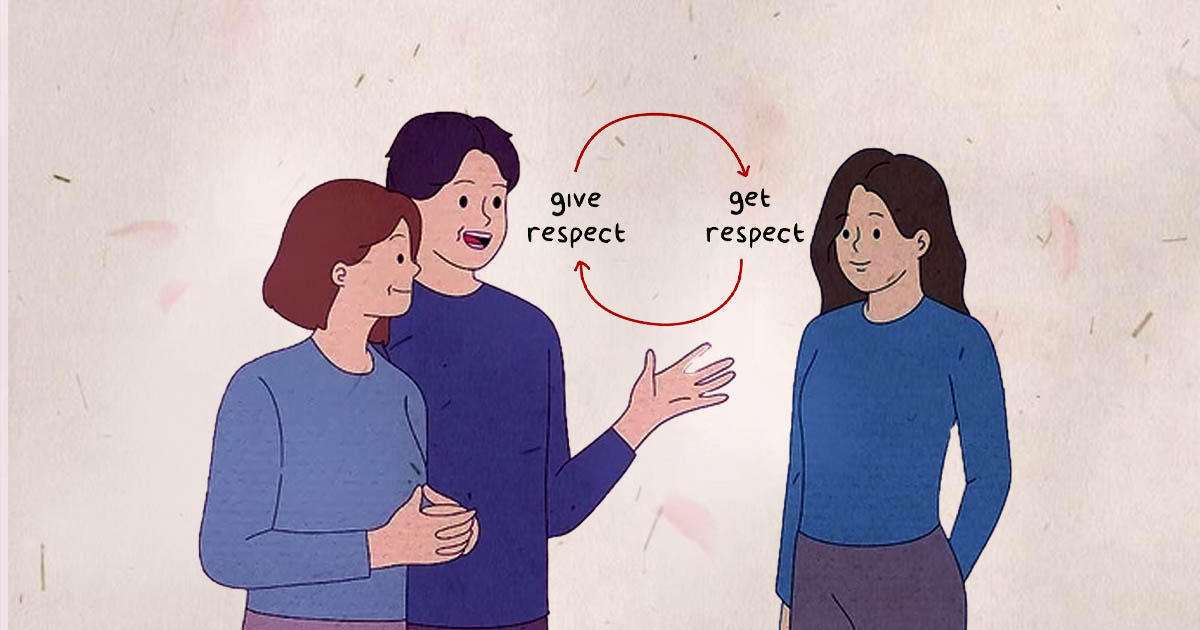Respect is an essential organically woven thread in the fabric of parenting, shaping the dynamics between caregivers and children. As we go through our struggles of raising children, learning how to get respect from your child can make the all the differenc.
As caregivers, it’s natural to desire respect from our children, but earning it goes beyond mere authority; it’s about fostering a mutual understanding and appreciation that forms the foundation of a strong parent-child bond.
In this article, we delve into the intricacies of cultivating respectful behavior in children and, in turn, earning their respect. From the fundamental principles of respect to practical strategies for nurturing it in our interactions, we explore how respect shapes children’s development and contributes to their overall well-being.
Importance of Inculcating Respectful Behavior In Children
Cultivating polite attitude in kids is not simply etiquette but also a cornerstone of their development into responsible, empathetic adults. Learning how to get respect from your child will allow your kids to pave the way for positive interactions and fruitful relationships in the school yard, classroom and beyond.

The following are the benefits of inculcating respectful behavior in children:
1. Foundation for Healthy Relationships:
Respect is the bedrock of healthy relationships. When children learn to value others’ point of view, feelings and personal limits they set up a preliminary stage for meaningful interconnections.
Developing respect within themselves as well as encouraging it in their relations enables children to develop those social skills that enable them to interact with people from different corners of the globe with empathy and understanding.
2. Empowerment Through Empathy:
Respect is more than outward behavior; it is rooted in empathy. A deeper appreciation of humanity’s interconnectedness arises when children understand and feel for other people’s experiences.
Empathy allows children to see every person’s intrinsic dignity irrespective of disparities. Parents and educators can nurture kindness together with respect while raising empathetic kids who will be able to negotiate complex social landscapes.
3. Cultivation of Cultural Competence:
Culture competence cannot be avoided due to an increasingly globalized world. Meaningful cross-cultural exchanges are built on respect for diverse cultures, faiths or backgrounds.
Encouraging children to embrace diversity does not just make them more inclusive individuals but gives them tools necessary for surviving in mixed environments. Fostering cultural competence at early stages promotes global outlook and leads to mutual comprehension between nations aiding cooperation across borders.
4. Promotion of Conflict Resolution Skills:
There are no two ways about it; for conflict resolution to be achieved, respect is key. Peaceful conflict resolution requires children to communicate respectfully and listen actively. To deal with disagreements constructively, children need resilience and adaptability which they can acquire by valuing others’ perspectives and looking for win-win situations.
Imbibing in young ones the skill of solving conflicts with respect cultivates a culture of co-operation and compromise that helps reduce escalations and build stronger relationships.
5. Preparation for Responsible Citizenship:
A foundation for responsible citizenship is built upon respect not just as an individual virtue but also on respecting others’ rights. Civic duty or accountability starts when parents and teachers teach their children to obey rules, laws and societal norms.
Children become active participants in their communities working towards the common good as they understand that respecting other people’s rights and freedoms is vital.
By nurturing kids to have regard to both institutions’ values as well as personal values, ethical framework required in order to become engaged citizens who contribute positively to his/her society can be developed.
And so by putting first things first, letting little children learn about respect we shape them into individuals who are going to participate in building a better world full of understanding and love.
Read More: How To Be A Great Parent To Your Child?
How To Get Respect From Your Child?
Enabling your child to respect you is not a one-way street, rather it is a two-way street that requires patience, consistency and empathy.

Here are ten effective strategies to help you how to get respect from your child:
1. Lead by example:
Actions speak louder than words. Show them what respect looks like through good treatment of others including themselves in kindness, patience and empathy. Whenever you interact with relatives, friends or strangers let your behavior represent the values of regard and consideration that you desire to teach your child.
2. Active listening:
When they talk to you, dedicate all your attention to them. Paraphrase their statements and indicate understanding; hence validating their feelings and opinions. Avoid jumping into conclusions or totally disregarding their concerns. Trust is built as well as encouraging open communication by showing that one values the thoughts of their kid.
3. Create clear expectations:
Clearly state the behaviors expected from kids using language which matches their age bracket among many other things such as boundaries. Having clear boundaries is a great way on how to get respect from your child.
Always talk about why these rules were developed and how important it is to be respectful towards oneself or others. While congratulating any progress made by children in meeting these standards, ensure that they are consistently enforced.
4. Consistency in discipline:
Discipline should be consistent so that children can understand repercussions of their actions. Make clear rules then enforce appropriate consequences when those rules are violated. However, consequences have to be fair with the misbehavior at hand though teaching not punishing should take precedence here.
5. Maintain Their Autonomy:
Give room for your child to make choices and decisions where possible promoting independence and self-sufficiency. Offer them guidance and support whenever necessary, but also respect their mistakes and allow them to learn from them.
By making them part of the decision-making processes, you enable them develop thinking capacity as well as self-confidence.
6. Recognize Their Work:
Celebrate all accomplishments made by your child including little ones. Use specific words of praise while encouraging in order to encourage good behavior and motivate further effort. Acknowledge how far they have come as individuals focusing on their own strengths instead of making comparisons with others.
7. Avoid Being Dictatorial:
Authoritative parenting focuses on setting boundaries and expectations that are clear but at the same time being responsive and nurturing. Learning how to get respect from your child also involves learning how to respect your child.

Do not employ fear or punishment as methods of motivating your child; instead use empathy when guiding him/her through difficult situations. Give reasons behind what you do in a bid to foster dialogue among family members based on mutual respect.
Read More: What is Authoritative Parenting? Discover It’s Advantages And Disadvantages
8. Show Empathy:
Demonstrate empathy to your child’s feelings and experiences, even if you don’t fully understand or agree with them. Let them know that it’s okay to express themselves openly and honestly without judgment. When you show empathy, it builds a stronger bond and creates a safe space for them to communicate their thoughts.
9. Respect Privacy:
As children get older, they need more privacy. Give them the personal space they need by not invading their private thoughts, belongings, or conversations without permission. When you respect their boundaries, you foster autonomy and independence while building trust.
Respect is a mutual feeling and learning how to get respect from your child will also involve you in giving the equal respect to your child.
10. Foster Trust:
Being honest, reliable, and consistent will help build trust between you and your child. By keeping promises and commitments, showing up when needed, and being there for open communication even when it’s difficult to hear can go a long way. When trust is established in the parent-child relationship, both parties have a strong bond built on mutual respect.
If you follow through with these strategies consistently then your relationship with your child will become one of respect and understanding. Keep in mind that this type of relationship takes time but the reward is worth it as it leads to a stronger parent-child bond overall.
Read More: Overcoming Parenting Anxieties: 10 Helpful Tips for New Moms
A Word From Mind Family
As we come to the end of our exploration of how to cultivate respect in children and how to earn respect from them, we at Mind Family would like to stress that respectful behavior has a far-reaching impact on personal growth and societal harmony.
Respect isn’t simply a set of manners; it is a guiding principle that shapes our relationship with ourselves and others. We hope the strategies shared in this article provide you with valuable tools for fostering mutual respect and understanding between parents and children.
Remember, building a respectful relationship is an ongoing process that requires patience, empathy, and consistent effort. Let us, together, continue to create a culture of respect and empathy within our families — as well as outside them.
Frequently Asked Questions (FAQs)
1. How to get respect from your child?
Earn respect through leading by example, active listening, setting clear expectations, consistent discipline, respecting their autonomy, acknowledging their efforts, avoiding authoritarianism, showing empathy, respecting their privacy, and fostering trust through honesty and reliability.
2. Why is respect important in parenting?
Respect lays the foundation for healthy parent-child relationships, promotes mutual understanding, empathy, and cooperation, and contributes to children’s social and emotional development, preparing them for responsible citizenship and positive interactions in the broader society.
3. What if my child doesn’t show respect?
Address disrespectful behavior through constructive communication, setting clear boundaries, providing consequences for misbehavior, modeling respectful behavior, fostering empathy, and reinforcing positive actions, while also being patient and understanding in guiding them towards more respectful interactions.

















Leave a Reply